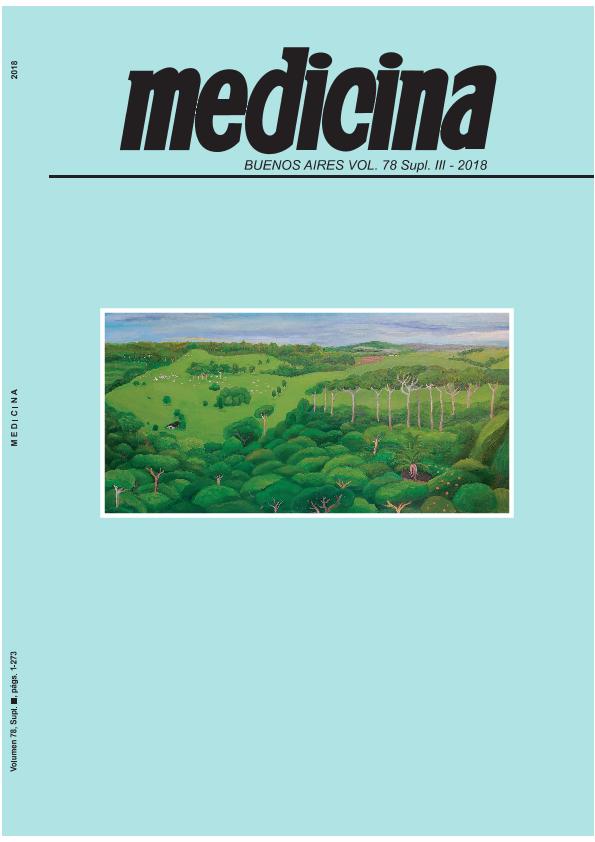Evento
Adesmia boronioides and Solidago chilensis, two novels herbal infusions with toxic effects against colon cancer derived cells
Colaboradores:
Perez Leiros, Claudia ; Baldi, Pablo Cesar
; Baldi, Pablo Cesar ; Crottogini, Alberto Jose
; Crottogini, Alberto Jose
 ; Baldi, Pablo Cesar
; Baldi, Pablo Cesar ; Crottogini, Alberto Jose
; Crottogini, Alberto Jose
Tipo del evento:
Reunión
Nombre del evento:
LXII Reunión Anual de la Sociedad Argentina de Investigación Clínica; LXVI Reunión Anual de la Sociedad Argentina de Inmunología; Reunión Anual de la Sociedad Argentina de Fisiología
Fecha del evento:
14/11/2018
Institución Organizadora:
Sociedad Argentina de Inmunología;
Sociedad Argentina de Fisiología;
Sociedad Argentina de Investigación Clínica;
Título de la revista:
Medicina (Buenos Aires)
Editorial:
Fundación Revista Medicina
ISSN:
0025-7680
e-ISSN:
1669-9106
Idioma:
Inglés
Clasificación temática:
Resumen
The development and progression of colon cancer is strongly influenced by diet substances that enter in the digestive tract. Herbalinfusions from medicinal plants usually contains phytochemicalsthat can restrain the development and progression of colon cancerin various ways. Flavonoids, an important group of these phytochemicals, report a recognized anti-inflammatory, antioxidant andsignal-regulating properties. Adesmia boronioides and Solidagochilensis are two native medicinal plants that contain flavonoids andhave reported promising antiproliferative activity against T-84 cells.Our aim was to study the toxic effects of herbal infusions obtainedfrom A. boronioides and S. chilensis on Caco-2 and HT-29 cells asmodels of colon cancer.We observed by MTT assay (after 72 h) that the percentage ofviable cells decreased with the increase in the concentration offreeze-dried infusions of both plant species (0 to 50 mg/ml) (p<0.05,n= 3). S. chilensis had a higher antiproliferative effect (EC50 (mg/ml): 0.57±0.06 and 0.18±0.02) in comparison with A. boronioides(EC50 (mg/ml): 1.27±0.08 and 2.87±0.21), for Caco-2 and HT-29cells, respectively. Colchicine was used as positive control. Similarresults were obtained by Trypan blue exclusion technique (p<0.05,n= 3). After staining the cells with AO and Et/Br, apoptosis cells(orange cells) were observed under the fluorescence microscope.The basal apoptotic percentage (24h) was increased in A. boronioides (35.0±4.1 and 46.2±8.2%) and in S. chilensis (47.2±6.7 and35.8±4.0%) with respect to control (3.8±4.9 and 2.7±3.1%) in Caco2 and HT-29, respectively (p<0.05, n=3). The Procaspase-3 expression was also checked.We conclude that the infusion of the both species exert strong antiproliferative activity on cells derived from colon cancer, partly dueto the modulation of basal apoptosis. Its effects show to be muchgreater in comparison with other species studied. These results provide a direction for further researches about the antitumoral potentialof these native plants.
Archivos asociados
Licencia
Identificadores
Colecciones
Eventos(CIEMEP)
Eventos de CENTRO DE INVESTIGACION ESQUEL DE MONTAÑA Y ESTEPA PATAGONICA
Eventos de CENTRO DE INVESTIGACION ESQUEL DE MONTAÑA Y ESTEPA PATAGONICA
Eventos(IDIM)
Eventos de INST.DE INVEST.MEDICAS
Eventos de INST.DE INVEST.MEDICAS
Eventos(SEDE CENTRAL)
Eventos de SEDE CENTRAL
Eventos de SEDE CENTRAL
Citación
Adesmia boronioides and Solidago chilensis, two novels herbal infusions with toxic effects against colon cancer derived cells; LXII Reunión Anual de la Sociedad Argentina de Investigación Clínica; LXVI Reunión Anual de la Sociedad Argentina de Inmunología; Reunión Anual de la Sociedad Argentina de Fisiología; Mar del Plata; Argentina; 2018; 1-4
Compartir



